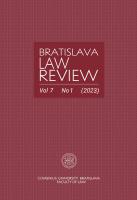The Smart Contract – Problems with Taking Evidence in Polish Civil Proceedings in the Light of European Regulations
The Smart Contract – Problems with Taking Evidence in Polish Civil Proceedings in the Light of European Regulations
Author(s): Berenika Kaczmarek-TemplinSubject(s): Law, Constitution, Jurisprudence, Civil Law, EU-Legislation
Published by: Univerzita Komenského v Bratislave
Keywords: Smart Contract; Civil Procedure; Evidence; Document; Polish Civil Law; Polish Jurisdiction; European Law
Summary/Abstract: In recent years, we have observed an amazing development of new technologies; many contracts come into effect without paper documents being signed. New possibilities have appeared, for example, the smart contract (also known as the digital contract or blockchain). In some cases, there is a dispute between the participants in the smart contract, e.g., as to the manner of its implementation. A court case might be necessary to resolve the dispute. As in any dispute, evidence proceedings will have to be conducted. The smart contract should appear as a proof. However, due to its unusual nature and complicated status under substantive law, as well as the fact that it is produced by new technological solutions, it is essential to determine its admissibility as evidence. The procedural law regulates in detail only traditional evidence. The smart contract has not been regulated in procedural regulations, therefore, its status needs to be established in the context of the existing documentary evidence. This article aims to contribute to the discussion on the status of smart contracts in civil court proceedings. Primarily, it should be determined whether the smart contract can be considered a document within the meaning of procedural law. In the Polish legal system, the document is defined as an information carrier whose content can be read. Accordingly, the smart contract meets the definition criteria. However, in the absence of provisions governing the manner of taking documentary evidence, it may be difficult to actually take such evidence and establish its value. The article also draws attention to Regulation (EU) No 910/2014 of the European Parliament and of the Council on electronic identification and trust services for electronic transactions in the internal market and repealing Directive 1999/93 / EC. Its art. 46 refers to the legal effectiveness of electronic documents and prohibits discrimination against evidence from such documents, which should undoubtedly contribute to the acceptance of a smart contract as evidence in civil proceedings.
Journal: Bratislava Law Review
- Issue Year: 7/2023
- Issue No: 1
- Page Range: 65-76
- Page Count: 12
- Language: English

